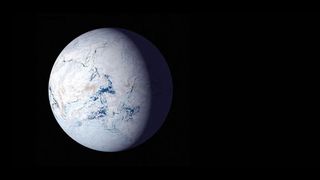
Some 700 million years ago, Earth might have looked something like this.
(Image credit: NASA)
Imagine a time when your favorite character in the Disney movie “Frozen” roamed the Earth — many millions of years ago, scientists say the picture in your mind was a reality. However, like Olaf probably wasn’t traversing that icy ancient Earth, Elsa wasn’t the one responsible for making our planet a big snowball in the first place. Nope, it was the great Mother Nature.
As hard as it might be to think that, at one point, Earth was a bright white bundle of ice and snow, research from a group of scientists from Australia offers pretty concrete evidence of this idea. Moreover, the team might’ve even uncovered how exactly the situation arose. “Imagine the Earth almost completely frozen over,” Dr. Adriana Dutkiewicz, Australian Research Council (ARC) Future Fellow and professor at the University of Sydney said in a statement.”That’s just what happened about 700 million years ago; the planet was blanketed in ice from poles to equator and temperatures plunged.
“However, just what caused this has been an open question.”
Related: ‘Snowball Earth’ may have been more of a ‘slushball,’ providing a refuge for early life

Deposits from the Sturtian Glaciation 717–664 million years ago in the northern Flinders Ranges, Australia. Research lead author Dr Adriana Dutkiewicz pointing to a thick bed of glacial deposits. (Image credit: Professor Dietmar Müller/University of Sydney)
According to Dutkiewicz, who led the study, the team was able to make critical discoveries during a field trip to the Flinders Range in South Australia. The researchers noted that glacial debris was still visible from the Sturtian Glaciation period and looked into data derived from EarthByte computer models. These models come from a collaboration between Australian Universities, international military organizations and industry partners to provide open access for scientists seeking geological and geophysical data.
By using this plate tectonic model of where Earth’s continents and ocean basins would have been some 700 million years ago, and pairing that model with another one that focused on carbon dioxide emissions, the team found the starting point of a powerful ice age known as the Sturtian glaciation, which spanned from 717 to 660 million years ago. As to what likely caused the beginning of this freezing time period? A significant loss of carbon dioxide emissions from volcanoes in present-day Canada.
This loss, the team says, resulted in a prolonged “Planet Ice.”
“At this time, there were no multicellular animals or land plants on Earth. The greenhouse gas concentration of the atmosphere was almost entirely dictated by CO2 outgassing from volcanoes and by silicate rock weathering processes, which consume CO2,” Dutkiewicz explained.
There is one question that remains: If the Earth could freeze over before, can it do that again?
Well, before humans (and even dinosaurs) ruled the Earth, the planet’s climate was influenced more naturally by geology and weather. That’s in contrast to today, when human activity such as burning coal exacerbates such natural changes. Dutkiewicz added that even though big changes do take time, we need to still be cautious of how we take care of our planet.
“Whatever the future holds, it is important to note that geological climate change, of the type studied here, happens extremely slowly,” Dr. Dutkiewicz said. “According to NASA, human-induced climate change is happening at a pace 10 times faster than we have seen before.”
The research was published in the February issue of the journal Geology.
Join our Space Forums to keep talking space on the latest missions, night sky and more! And if you have a news tip, correction or comment, let us know at: [email protected].
Breaking space news, the latest updates on rocket launches, skywatching events and more!
Meredith is a regional Murrow award-winning Certified Broadcast Meteorologist and science/space correspondent. She most recently was a Freelance Meteorologist for NY 1 in New York City & the 19 First Alert Weather Team in Cleveland. A self-described “Rocket Girl,” Meredith’s personal and professional work has drawn recognition over the last decade, including the inaugural Valparaiso University Alumni Association First Decade Achievement Award, two special reports in News 12’s Climate Special “Saving Our Shores” that won a Regional Edward R. Murrow Award, multiple Fair Media Council Folio & Press Club of Long Island awards for meteorology & reporting, and a Long Island Business News & NYC TV Week “40 Under 40” Award.
>>> Read full article>>>
Copyright for syndicated content belongs to the linked Source : Space.com – https://www.space.com/earth-snowball-era-climate-change-frozen










